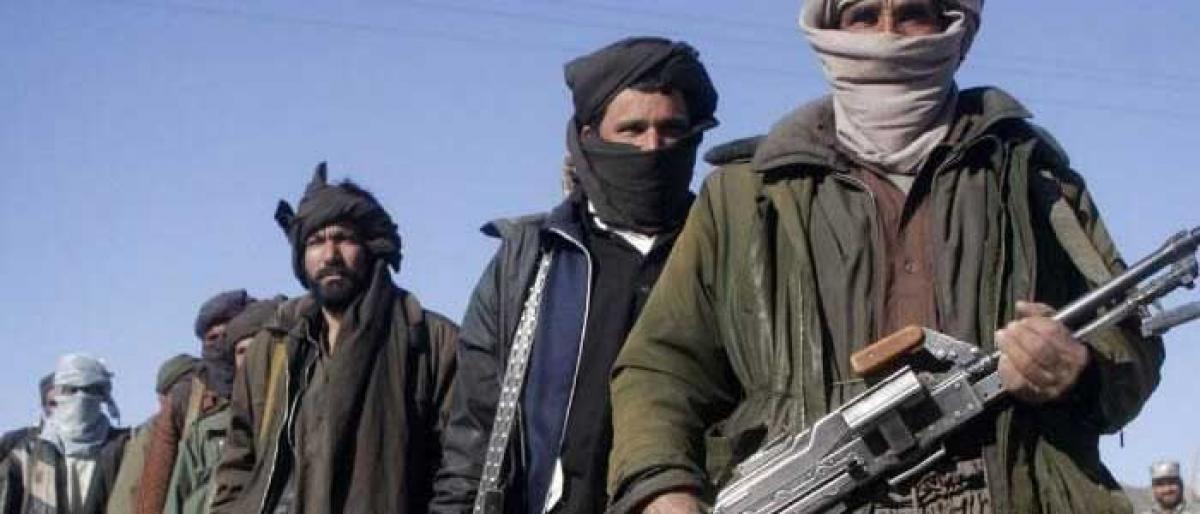Live
- Chandrababu Congratulates Gukesh on Historic Chess Achievement
- How Long Can You Safely Wear Makeup?
- ED conducts raids at two places in Bengal in chit fund case
- BJP Tamil Nadu President Expresses Confidence In Resolving Tungsten Mining Concerns In Madurai
- Karnataka Reviews Lake Safety Ahead of Monsoon: Minister Bhosaraju Tells Upper House
- Udupi MP’s queries, More key highways on high-priority
- Investing in Skills: Education Loans Paving the Way for Career Success
- Ghaggar river’s two stretches identified as polluted: Govt
- ICC chief Jay Shah meets Brisbane 2032 Olympics organising committee CEO
- Oxford Grammar High School Celebrates 44th Annual Sports Day with Grandeur
Just In

Exploratory meetings in Pakistan between a high-level Taliban delegation and a representative of a prominent Afghan politician have fuelled speculation of a revival of long-stalled talks on ending Afghanistan\'s 16-year war that kills thousands each year.
Kabul: Exploratory meetings in Pakistan between a high-level Taliban delegation and a representative of a prominent Afghan politician have fuelled speculation of a revival of long-stalled talks on ending Afghanistan's 16-year war that kills thousands each year.
Similar hopes have repeatedly been dashed since the first direct talks between the Western-backed Afghan government and the Taliban broke down almost as soon as they began in the Pakistani hill station of Murree, outside Islamabad, in 2015.
But US Ambassador to the United Nations Nikki Haley's remarks this week that talks were closer than ever – coming after Monday's unofficial meeting in Islamabad – have renewed interest in a process that had seemed completely stalled.
A statement from the Russian foreign ministry on Wednesday called for urgent direct talks between the Taliban and the government, adding that Russia, which has maintained contacts with the insurgent movement, could host them. "I think something is cooking," said Mohammad Ismail Qasimyar, a senior adviser to Afghanistan's High Peace Council, which was established to oversee the peace process.
Low-level contacts between the Afghan government, international groups including the UN and groups close to the Taliban have continued even as the insurgency has escalated over the past three years. But progress has always been blocked by the deep mistrust between the government and the Taliban, as well as uncertainty about the position of neighbours including Pakistan, which Afghanistan has long accused of aiding the insurgents.
Many in Afghanistan argue that Pakistan, which has come under heavy pressure from Washington, is simply encouraging hopes of progress in order to buy time. One senior government official in Kabul, noted that speculation about peace talks regularly surfaces in the winter, while the Taliban regroups ahead of its spring offensive. "None of these meetings or talks about talks will help achieve peace," he said.
‘US policy working’
The UN Security Council is due to hold a debate on Afghanistan's future later on Friday following a visit to Kabul by council members this week, and is expected to call for a stronger regional partnership between Afghanistan and Central Asian neighbours. It is the latest in a series of steps aimed at building agreement among Afghanistan's neighbours.
Under a new strategy announced last year by US President Donald Trump, the United States has stepped up its assistance to Afghan security forces, particularly through air strikes, with the aim of preventing any Taliban military victory and forcing the insurgents to accept peace talks.
"The US policy in Afghanistan is working," Hayley told reporters. "We're closer to talks with the Taliban and the peace process than we've seen before." The Taliban itself, which controls or disputes government control over more than a third of the country, says it wants a peaceful solution but says negotiations would depend on international troops leaving Afghanistan.
But, considerable obstacles remain. The government in Kabul is deeply divided, with increasing hostility between rival ethnic and party groups that will make it difficult to establish a unified negotiating stance.
The Taliban has its own divisions and the ability of its leader Mullah Haibatullah Akhundzada to command the affiliated Haqqani network, blamed for major attacks on civilian targets in cities such as Kabul, may be tested.
By: James Mackenzie & Hamid Shalizi

© 2024 Hyderabad Media House Limited/The Hans India. All rights reserved. Powered by hocalwire.com







